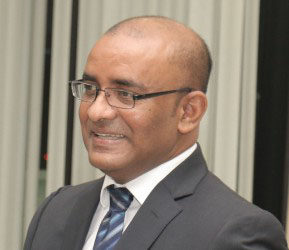September 30,2016
Former president Bharrat Jagdeo on Wednesday defended a decision by late former president Janet Jagan in 1999 to grant ExxonMobil 600 petroleum blocks, far exceeding the 60 blocks prescribed by the law.
“This country should be grateful to Janet Jagan… It was because of Janet giving that block out …that today this government can boast about an oil and gas industry,” Jagdeo told a press conference, while adding that if there was a similar situation while he was in office, he probably would have done the same thing.
Jagdeo was at the time responding to a recent criticism of Jagan’s decision by analyst Christopher Ram in his weekly Stabroek News column, ‘Every Man, Woman and Child in Guyana Must Become Oil-Minded’ for September 22.

“Janet Jagan granted the company a Prospecting Licence over approximately six hundred blocks when the law sets a limit of sixty blocks, except where special reasons exist for a larger number,” Ram wrote, while noting that it would not be easy to justify the excess that had been granted.
According to Jagdeo, prior to the ExxonMobil discovery in 2015, though lots of money had been invested in oil exploration, nothing had been found. As a result, he said when Jagan granted the blocks to the company, there were not many “takers.”
“The mere fact that there were so many blocks to give out and there is so much remaining proves our point that there were not takers at that time,” Jagdeo said, before adding that Guyana was a high risk country to put money into for oil exploration.
“I don’t know what was in Janet’s mind because as the agreement said there may have been extenuating [circumstances]… the president or the minister can give larger blocks depending on the special circumstances,” he added.
“We don’t have anything to hide about it. Janet Jagan did something that I am sure in her judgement was the right thing to do especially in light of geopolitical considerations and what she did led to the discovery of oil in Guyana,” he insisted.

Jagdeo told reporters that in 2008, he did sign an extension agreement. He said that Ram wanted to know why the relinquishment obligation did not happen when Jagdeo signed the extension.
Ram had explained that the law requires that any extension be accompanied by a reduction of 50% of the remaining blocks still covered by a Prospecting Licence, so that 300 blocks should have been given up at the first extension.
Jagdeo told reporters that the original agreement said that a licensee gets the block for four and a half years, after which 50 percent has to be given up. This is followed by a renewal for three years after there is another 50% reduction. “So… if you haven’t done nothing, you go down to a fraction of the original agreement,” he said.
Jagdeo in explaining why the then government did not ensure the relinquishment in keeping with the law, added that on September 29, 2000, ExxonMobil invoked force majeure because of Suriname’s illegal acts against the CGX oil rigs that were offshore.
Force majeure is a clause that frees a person from fulfilling contractual obligations due to an unforeseeable act or circumstances.
According to Jagdeo, once a company declares force majeure, everything is frozen. He said in September, 2007, the UN pronounced on the Guyana-Suriname dispute, resulting in the border being demarcated. A year later, the force majeure clause was lifted so. He insisted that from the period 1998 to 2008, nothing could be done.
According to him, he was taking time to explain the matter so as to show that there was no “underhand deals” in relation to relinquishment under the previous administration.
